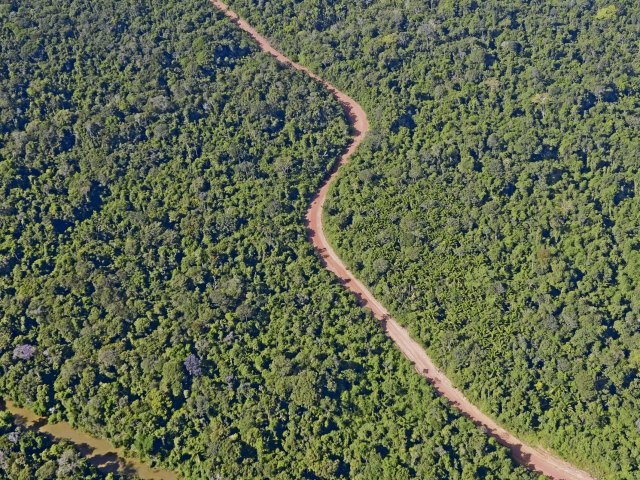Roads through untouched forests are often a gateway for logging.
Photo: imageBROKER/Florian Kopp
Forests offer rich economic potential from which people benefit intensively. This happens in Europe with so-called commercial forests. The extensive deforestation for timber production, agriculture and livestock breeding, the laying of roads and the construction of settlements has long been carried out here. In tropical countries, deforestation of rainforests is progressing rapidly for the same reasons, but there are still untouched patches with vibrant biodiversity.
Despite government regulations and the designation of protected areas, rainforests are often cleared secretly and illegally. Now researchers from Australia’s James Cook University (JCU) have discovered an early indicator of impending deforestation: ghost roads.
Ghost roads are those that have never been approved and often cannot be found on any maps. When mapping tropical forests, researchers have found many such roads. “They are built by a variety of people, including legal and illegal farmers, miners, loggers, land grabbers, land speculators and drug traffickers,” says Bill Laurance of JCU’s Center for Tropical Environmental and Sustainability Science.
nd.Kompakt – our daily newsletter

Our daily newsletter nd.Compact brings order to the news madness. Every day you will receive an overview of the most exciting stories from the world editorial staff. Get your free subscription here.
Together with lead author Jayden Engert and 200 volunteers, Laurance examined high-resolution satellite images of the islands of Borneo, Sumatra and New Guinea, an area totaling 1.42 million square kilometers. “Our intensive testing revealed a total of 1.37 million kilometers of road – 3.0 to 6.6 times more roads than were found in leading road datasets worldwide,” says the report published in April in the journal Nature Study “Ghost Roads and the Destruction of Asia-Pacific Tropical Forests”. “This is consistent with findings from previous studies in other developing countries such as Cameroon, the Solomon Islands and the Brazilian Amazon,” says Laurance. In the regions examined by the JCU experts alone, a third of such roads were created for oil palm plantations.
The construction of roads literally paves access to previously remote natural areas, which experts say is leading to a “dramatic increase” in environmental damage from activities such as logging, mining and land clearing. In the entire study area, road construction almost always preceded local forest loss. Of 38 potential “biophysical and socioeconomic covariants,” road density was “by far” the strongest predictor of deforestation. Most of these roads are unpaved.
Meanwhile, global road construction continues rapidly. “By the middle of this century, the Earth is expected to have about 25 million kilometers of new paved roads compared to 2010 – enough to circle the planet more than 600 times,” says the study, citing data from the International Energy Agency . 90 percent of these roads would be built in tropical and subtropical developing countries with exceptional biodiversity. Particularly in low-income countries, the construction of ghost roads is encouraged because laws are not enforced and corruption is widespread.
The study authors are not against road construction per se. Rather, they emphasize that roads promote “a number of important social functions, such as promoting trade and improving access to natural resources and farmland.” But they warn: “Without effective planning and law enforcement, roads can also open a Pandora’s box of environmental and social problems.”
It is worrying that the extent and length of roads in the tropical Asia-Pacific region is greatly underestimated, says Laurance. “Overall, our results indicate that the rapidly growing, barely scientifically studied ghost roads are among the greatest direct threats to tropical forests.”
Subscribe to the “nd”
Being left is complicated.
We keep track!
With our digital promotional subscription you can read all issues of »nd« digitally (nd.App or nd.Epaper) for little money at home or on the go.
Subscribe now!
demo slot judi bola online judi bola online judi bola online
